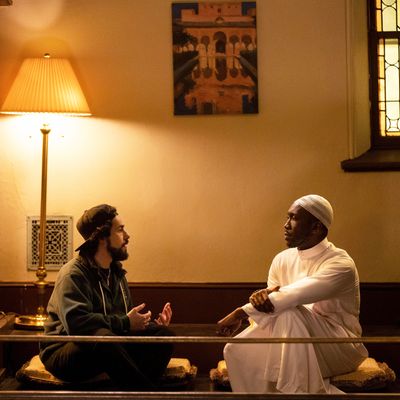
Early in Ramy season two, the Hulu comedy’s eponymous protagonist (played by Ramy Youssef) explains to his new spiritual guide Sheikh Ali (Mahershala Ali) that he’s really over himself. He feels like there’s a hole inside himself that he doesn’t know how to fill; he’s been searching for meaning but been unable to see past his own desires. “I only ever think about me,” Ramy says, “and I hate it.” Maybe the lesson, Sheikh Ali suggests, is that Ramy should learn to kill his ego. “That’s what I want! I want to kill my ego,” he replies.
A protagonist swearing that he needs to be less self-centered is an odd position for a show to put itself in, especially when the show is named after its creator, writer, and star. But in its best moments, that’s exactly what Ramy’s second season does. Ramy’s call to be less self-centered occasionally means he’s much less of a central character; his arc is a less powerful driver of the entire season, and the show foregrounds other members of his family. Still, it’s surprisingly obnoxious when Ramy keeps complaining that he can’t stop thinking about himself first. While Ramy’s second season ultimately turns that into an interesting, meaningful collapse for its protagonist, there’s no getting around the fact that especially in the early episodes, viewers have to spend an awful lot of time with a guy whose sweaty efforts to try to be good are only slightly less annoying than his previous dirtbag low points.
Ramy’s strength is how well it does single-episode stories, especially stories about its minor characters. The highlight of the season is the show’s penultimate episode, told from the perspective of Ramy’s unbearably boorish Uncle Naseem (Laith Nakli), but it also shines in the episodes about Ramy’s father, his mother, and his sister. The episode about Naseem is so particularly effective, though, because it provides such a poignant contrast to Ramy himself. Naseem’s not that different from Ramy. His behavior is worse, yes, and to most Ramy viewers, his misogynistic, insulting running commentary will feel far more egregious than any of Ramy’s more gently egotistical lines of thought. But they run on parallel tracks, several decades apart. Uncle Naseem is Ramy, hardened by years of increasing selfishness, stewing exclusively in his own thoughts. Uncle Naseem is a warning for Ramy, a scary possible future that he doesn’t even recognize because he’s so focused on his own problems.
The Uncle Naseem episode also manages to perform something for Naseem that Ramy can’t quite ever seem to do for Ramy. Naseem’s horrible because he’s horrible, yes, but he’s also horrible because he’s filled with a buried self-loathing thanks to long-standing cultural prejudices that he cannot escape. Ramy, by comparison, comes off as even more listless, his exhaustion with himself even more baseless and unmotivated. Ramy complains regularly about feeling empty inside, about how frustrated and sad he is that his internal compass can’t ever seem to point him toward some purpose. It’s an emotional conflict that makes sense on paper and is hard to translate into compelling TV in practice. Because he feels like he’s carrying around a hole inside of him, he ends up coming across as pretty empty.
By the end of the season, though, Ramy at least partially redeems its protagonist problem. The groundless ennui Ramy experiences is revealed to be sadness about something that happened in the break between seasons one and two, an event Ramy doesn’t narrate until the end of the season. It’s a nice storytelling trick that pulls off a retroactive remake of what we thought we understood about that character. But even though it helps explain those earlier episodes, understanding Ramy’s grief doesn’t retroactively make them feel stronger.
What does help is Mahershala Ali, who’s magnetic as Sheikh Ali and who has all the sense of a partially concealed internal life that Ramy so often seems to lack. Their conversations are the best parts of Ramy’s story this season: He’s so clearly happiest when he’s able to feel subservient to a stronger personality, and Ali more than fits the bill. He’s also buoyed by the presence of the sheik’s daughter Zainab (MaameYaa Boafo), who becomes an equally interesting foil for him — a love interest, but also a yardstick he uses to measure his own moral progress, and one he eventually tries to just hitch himself onto in lieu of actually doing any internal growth.
For Ramy, season two works best as an arc, a whole story that feels stronger as a total sum than it does when broken down to its constituent pieces. For everyone else, though, Ramy is most interesting and most arresting in the way it tells separate stories, finding flaws and humor and humanity for its minor characters in ways it often struggles to do for its main character. My sense is that Ramy most wants us to come away from the season with the image of Ramy’s eventual implosion. It’s a depressing but maybe deserved ending for the show’s main character. For me, though, the show’s portraits of the rest of his family are significantly more memorable and more lovely. In the end, Ramy does to its protagonist exactly what Ramy so desperately wants to do for himself: It’s very good at killing his ego. It erases him.
Want to stream Ramy? You can sign up for Hulu here, or as part of a bundle with Disney+ here. (If you subscribe to a service through our links, Vulture may earn an affiliate commission.)


